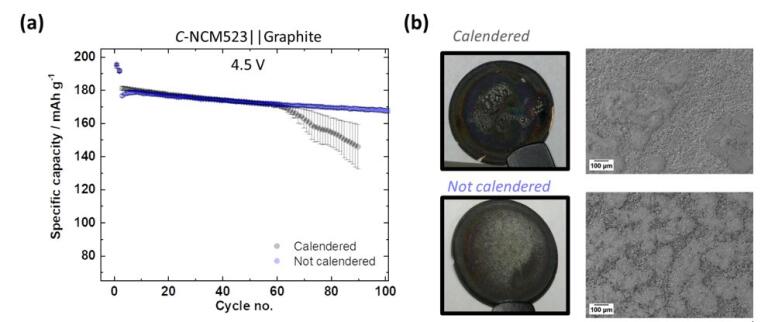Higher Energy Density for Lithium-Ion Batteries
Alternative battery systems, such as sodium and lithium solid-state batteries, are often in the focus of the media public as hopefuls for high energy densities. However, in a recent publication, researchers from the Helmholtz Institute Münster (HI MS) and MEET Battery Research Center show that the potential of the common lithium-ion battery (LIB) has not yet been exhausted. Electrochemical experiments illustrate that the energy density can be further increased by better controlling fault cascades.
Inconspicuous Sources of Error
Theoretically, the energy density of LIBs can be significantly increased with the materials currently in use by raising the end-of-charge voltage. In practice, however, this has so far failed due to the greatly shortened service life of the battery. Today, a compromise must be made between energy density and service life so that both properties can be combined in a meaningful way.
The team led by Dr Johannes Kasnatscheew from HI MS as well as Dr Tobias Placke and Sven Klein from MEET Battery Research Center is now highlighting the relevance of inconspicuous parameters that are often overlooked in research, such as electrochemical and electrode processing parameters.
The 'electrode crosstalk' error cascade of high-voltage application represents a complex process in which the smallest differences in material and charging protocol can lead to misleading observations in the battery cell, thus hampering its further development. ‘Electrode crosstalk’ describes the unwanted interaction of the electrodes, in this case metal migration from the cathode to the anode.
Pragmatic and Cost-Effective Solutions
Kasnatscheew explains the new solution approach: "From the identification of the parameters, quite pragmatic strategies can be derived. For example, the effect of the relatively complex and expensive cathode coatings can be achieved by simply and quickly changing the charging protocol in the first cycle – and without any extra cost." His colleague Sven Klein from MEET adds: "The type of anode processing can also influence whether and how quickly the cell shorts out and fails under high voltage." This knowledge will facilitate future systematic research and the development of more energy-dense LIBs

Sven Klein, Peer Bärmann, Dr Markus Börner, Dr Jan-Patrick-Schmiegel, Dr Tobias Placke (MEET), Lukas Stolz, Dr Kristina Borzutzki, Dr Johannes Kasnatscheew (HI MS) and Prof. Dr Martin Winter (MEET and HI MS) have published their results as an open access article in the journal ACS Applied Materials & Interfaces.

